Gaydrungs started serving in gewogs in the 1960s. They were exempted from gungda woola (customary labour contributions) and were compensated in various ways. Their main duties then were to collect taxes and draft correspondences for the gups. That changed over time, along with their benefits and salaries.
The gaydrung’s post became an issue after the Royal Civil Service Commission’s OD exercise pointed out that their posts were not required. The Local Government Act and the Local Government Entitlement Act make no mention of the gaydrung and do not recognise the position. However, the local government rules and regulations, which are drawn from the Act, have specified the roles and responsibilities of the gaydrungs. The rules and regulations mandate gaydrungs to collect taxes and insurance premiums from villagers, facilitate land transactions, and take care of documents in the gewog office.
Except for the house rent allowance of Nu 3,500, gaydrungs earn a monthly salary of Nu 16,120. They feel treated unfairly without a proper salary system.
The government has a mandate to give jobs. There are more than 200 gaydrungs and doing away with the post is robbing them of their livelihood. It is a sensitive issue, at least politically.
We have elected gups, some with university degrees, information technology has changed how offices are managed and we are gradually embracing e-governance. But we are not there yet, so say the villagers and LG officials. Therefore, there is support for the clerks from elected leaders who feel that the post is as important as that of the gup’s and mangmi’s.
The Cabinet has asked the department of the Local Government to submit a proposal regarding the post. We can surmise that the department would propose in favour of retaining the post and institute a proper remuneration package. Because the department’s own study has shown that the gaydrung is needed and that they shoulder responsibilities that no other official in the gewog administration does.
The last government extended their contract by two years. The current government extended it by three more years. Their contract ends in around four months on April 2, 2022.
Their shaky employment status had sent them repeatedly in the past filing petitions and meeting politicians to extend their service or to retain their post. This is an unhealthy trend. It is high time we bring closure to the matter.


